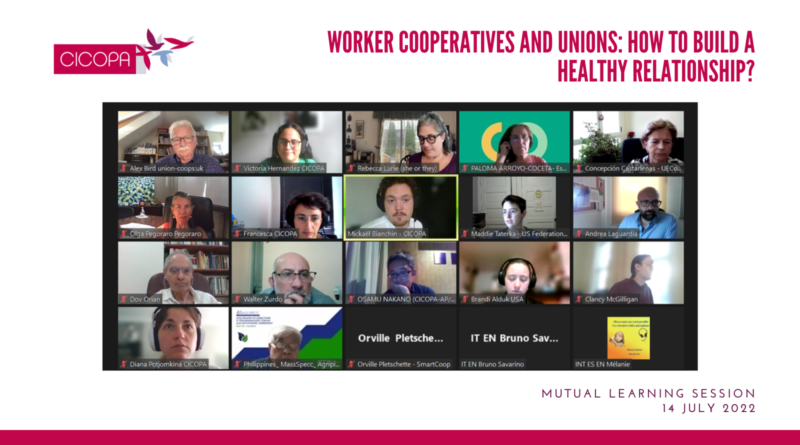Worker cooperatives and unions: how to build a healthy relationship?
9 August 2022
We exchanged examples of cooperation between worker cooperatives and trade unions with our members.
On the 14 of July 2022, CICOPA organized a Mutual Learning Session (MLS) between members on the topic “Worker Cooperatives and Unions: How to build a healthy relationship?”
With the participation of around 52 members from 17 countries around the globe, participants discussed why it is important for worker cooperatives and unions to cooperate, what are the opportunities, and the challenges that derive from this relationship.
Three speakers showcased examples from their countries:
- UK: The experience of union-coops:uk presented by Alex Bird, cooperator, and trade union activist
- USA: The Union Co-ops Council of the US Worker Cooperatives Federation, presented by Rebecca Lurie, Founder of the Community and Worker Ownership Project at the City University of New York (CUNY)
- ITALY: The Italian model presented by Andrea Laguardia, Head of the Multiservices, Environmental Hygiene and Catering Sectors of the Italian Federation, Legacoop Produzione e Servizi.
Participating members were invited to share their organization’s experience in working with unions as well as their own perceptions of the challenges and opportunities linked to these relationships.
The main outcome, common to all examples, was the need to reinforce the dialogue with the unions and increase the mutual understanding between unions and worker cooperatives. Often cooperators are unaware of what all services unions can provide, and unions are not aware of the peculiarities of the worker cooperatives, and worker members’ model as compared to other types of cooperatives.
From this collaboration, many opportunities can arise, for cooperatives to provide extra attention to the workers in the cooperatives, as well as connect them to a larger network of workers from other companies in the sector giving them a strong impact when influencing policy and legislation.
From the perspective of Unions, working more closely with cooperatives could be a way to promote an alternative to the current capital-focused mainstream model of enterprise, support a model that provides better working conditions for workers, and establish an ally in the structural social dialogues.
Overall, the importance of collaboration between cooperatives and unions, as well as a deeper relationship between the two was strongly reiterated by the speakers and participants during the MLS.

